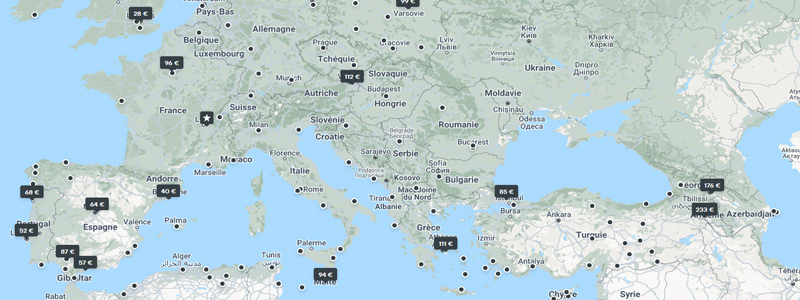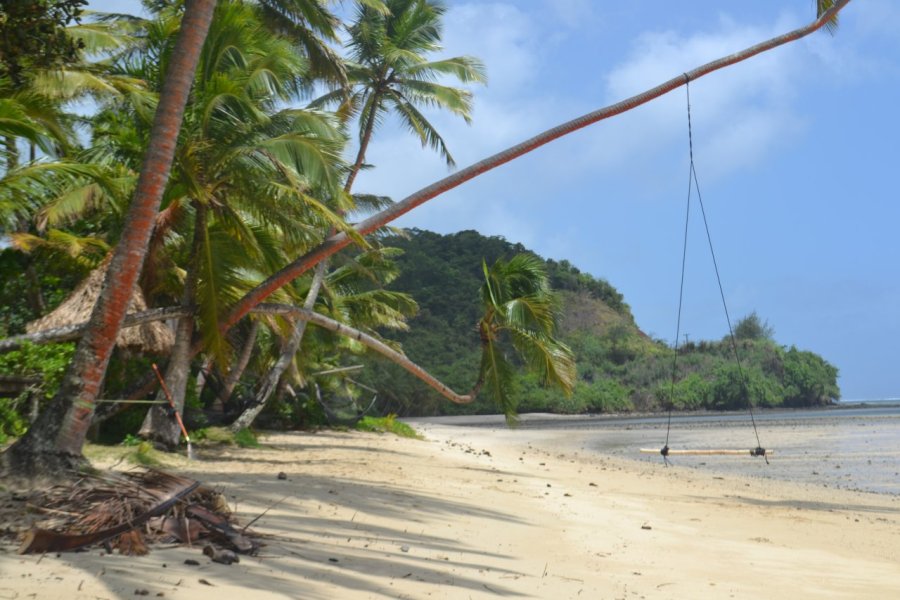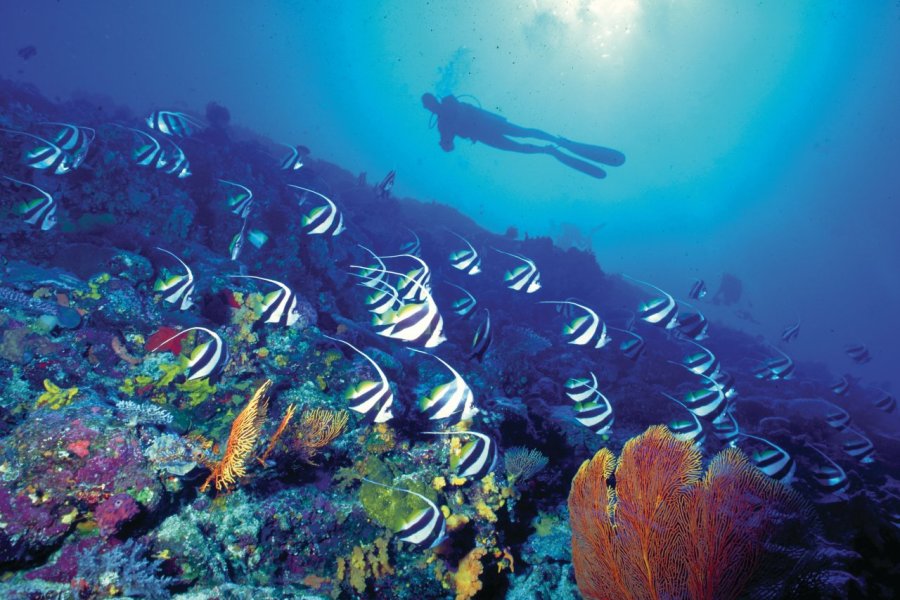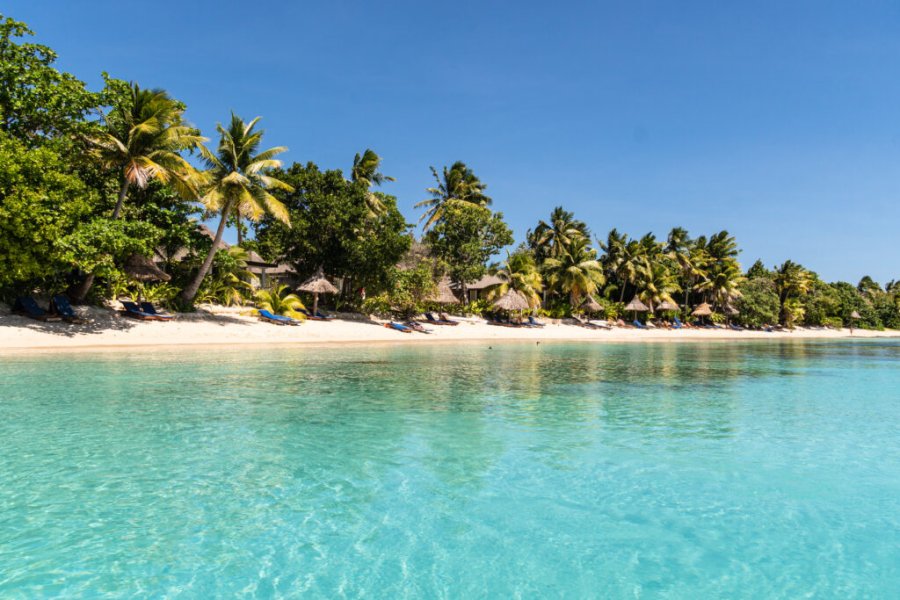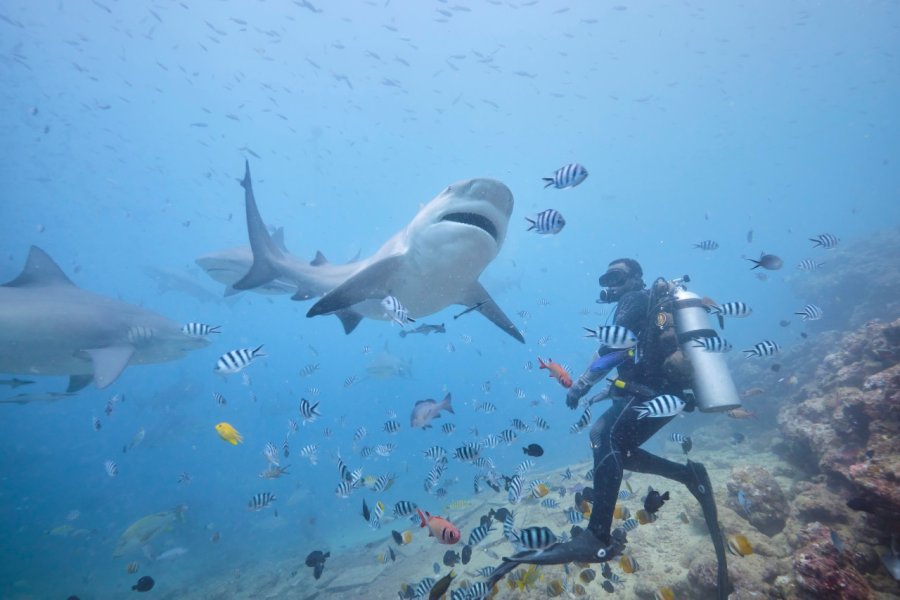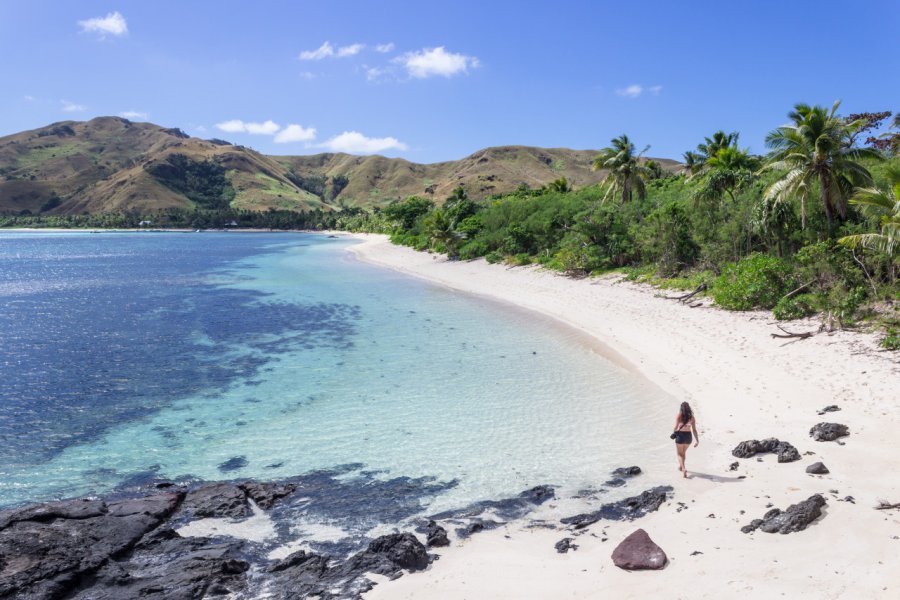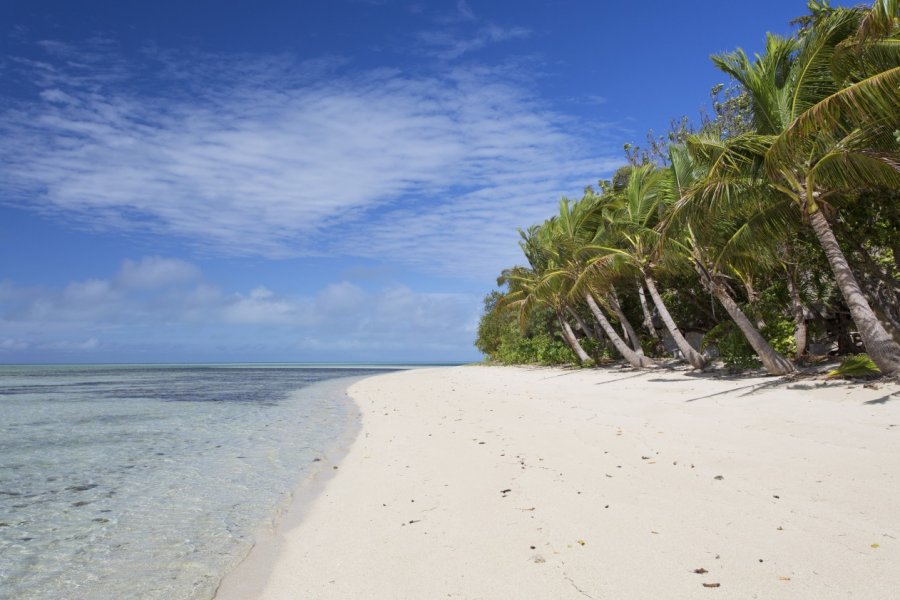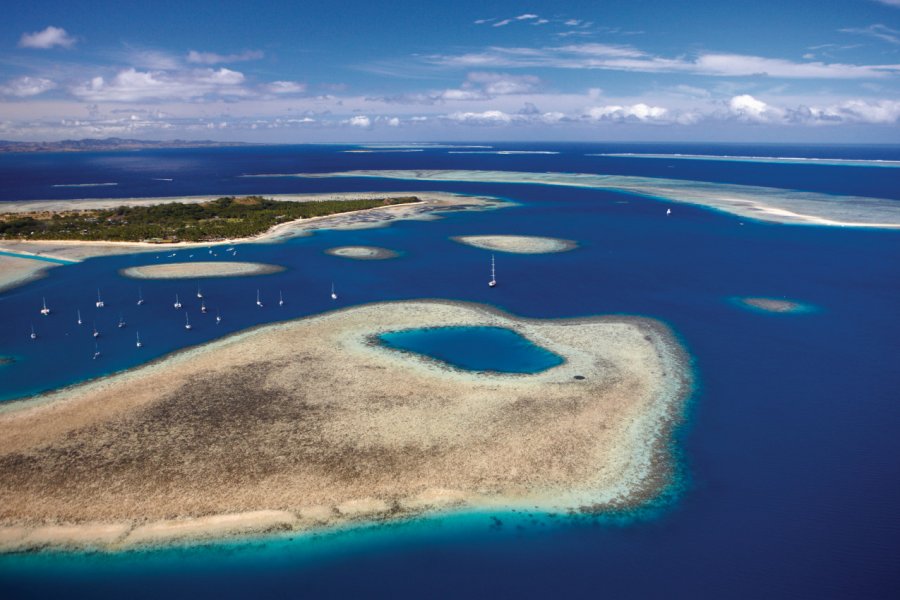Travel guide Fiji
As a country in Oceania, the mere mention of Fiji brings with it the promise of paradise islands, lazing in a lagoon against an azure sky, idyllic white-sand beaches bathed in turquoise waters... and the cliché is entirely justified. A visit to this corner of the South Pacific, made up of more than three hundred small islands - from the beautiful Viti Levu to Vanua Levu, via the well-guarded Lomaitivi archipelago, not forgetting Taveuni and, of course, the Mamanucas and Yasawas islands - gives you the feeling of being on a postcard. And if that's all it was! The inhabitants of these mountainous, rainforest-covered expanses, where the ocean is everywhere, are incredibly welcoming, living almost out of time, with a smile on their lips, proud of their country and their culture. A surfer's Eldorado with the most beautiful beaches and the destination of choice for honeymoons, family trips or a diving holiday in the coral reefs, the sun shines all year round on virgin and majestic territories through which the Fiji travel guide will accompany you. Enjoy your trip to the other side of the world under the coconut trees!
To find out more about Fiji, take a look at this video dedicated to this destination. It gives you a glimpse of the beautiful scenery and local culture, with images of white sandy beaches and crystal-clear waters. This video is a great way to discover Fiji at your own pace.
What to see, what to do Fiji?
-
Book an activity
-
Customized travel
- The most beautiful cities Fiji
When to go Fiji ?
When to go to Fiji? Fiji is a very popular destination all year round, as the weather is relatively mild in all seasons, except from January to March. For the Christmas holidays and also in July and September during the school vacations to escape the winter, travelers fromAustralia or New Zealand flock there in mass and the sites are overcrowded. The best time to go to Fiji is from October to November, just before the rain arrives, when the sun shines brightly.
You can also take into account the festival calendar to know when to go to Fiji:
June. International Bula Marathon in Nadi.
July. Bula Festival in Nadi.
August. Hibiscus Festival in Suva.
September. Sugar Festival in Lautoka.
October. Back to Levuka Festival in Ovalau.
Suggested addresses Fiji
Travel Fiji
-
Find a hotel
-
Car Rental
-
International e-SIM package
-
Find a local agency
Un voyage aux Fidji offre des possibilités d’itinéraires multiples. L’archipel est composé de plus de 300 îles donc il faudra faire des choix ! Idéalement, nous vous conseillons un séjour d’au moins trois voire quatre semaines pour bien profiter de votre voyage, il serait dommage de faire plus de 24h de vol pour rester seulement deux semaines aux Fidji. La thématique de votre voyage sera essentielle aussi, à vous de déterminer si vous souhaitez privilégier la plongée, les escapades dans la nature, rester dans des circuits touristiques balisés ou bien partir un peu plus à l’aventure. Une étape à Viti Levu semble indispensable dans tous les cas car votre vol international arrivera très certainement à Nadi. Mais vous pouvez ensuite décider de privilégier une autre île ou plusieurs autres îles. Vanua Levu et Taveuni sont des destinations coup de cœur facilement accessibles. Les plus aventureux testeront aussi les autres îles !
Find unique Stay Offers with our Partners
How to go Fiji
How to go alone
The average price of a flight from France to Nadi is around 900 € in low season, and at least 1 600 € in high season. Note that the price variation depends on the airlines, but especially on the period you choose to travel. You should expect a flight time of about 30 hours. For accommodation, it is also better to take precautions and book well in advance of your departure.
How to go on a tour
A trip to Fiji is not something to be taken lightly. Advice to travelers: using the services of a tour operator can often facilitate your steps. There are many travel agencies that specialize in the destination and can tailor-make a trip to Fiji, whether it's a family vacation or a honeymoon.
How to get around
Fiji has more than 300 islands, so if you choose to stay outside Viti Levu where the international airport is located, you will need to use another means of transport : plane or boat. With the extra costs involved... What do you want, the end of the world is the end of the world! You don't reach it by hitchhiking, otherwise it would be too simple, and there would be too many people!
Featured articles Fiji
Discover Fiji
While you're preparing for your trip or on one of the planes taking you from France to Fiji, you'll certainly have time to read the following pages, which aim to introduce you to Fiji. The geographical distance between France and Fiji certainly explains why the history, way of life and specificities of Fijian culture are relatively unknown in France. We'd like to give you an overview of Fiji's history, climate and geography. We also take a look at the Fijian population, Fiji's cultural and festive agenda and the country's current issues. Our special feature on diving is designed to help you discover Fiji's most beautiful dive sites and give you some practical advice. We'll also tell you which souvenirs to bring back with you from your trip.
Pictures and images Fiji
The 12 keywords Fiji
1. #Bilibili
Bilibili are bamboo rafts, also known as "no-return rafts". They can be used by villagers to store their produce. Tour operators often include a bilibili section in their itineraries, so you can get the full local experience. Bilibili races are even organized in Fiji.
2. #Bula
It's certainly the word you'll hear most in Fiji. It's pronounced "bou-lah". Fijian children and adults will often greet you in the street with a Bula to say hello. The word is also used to wish welcome, health and happiness. The literal meaning of this word is "life".
3. #Bure

This is the traditional Fijian dwelling, built entirely of wood, notably coconut. Bures (pronounced "buré") were often built collectively in villages over a period of several weeks or even months. This type of housing was later abandoned by the locals in favor of solid construction, but is now fashionable in luxury hotels.
4. #Fiji time
The notion of " Fiji time " corresponds to the very relaxed relationship between Fijians and time. It's impossible to know what time the bus will actually pass, offices will be closed during business hours and punctuality is unknown here. Once you've got the hang of it, though, it's quite pleasant - you become much less stressed!
5. #Kava

Kava is Fiji's drink of choice and a highlight of Fijian social life. You'll be able to find kava roots at the market; this tree is a member of the pepper family. Kava is reputed to have relaxing, even anxiolytic effects. Not everyone likes the taste, but make your own!
6. #Kokoda
This is Fiji's national dish: it consists of raw fish marinated in coconut milk, lemon, onions and chillies (not usually very spicy). It is often served with manioc French fries, another Fijian staple. Kokoda is a very fresh and delicious dish, and we recommend that you give it a try!
7. #Meke

Meke is a traditional Fijian dance with a long cultural heritage. Songs and mime accompany the dance. Depending on the type of meke performed, the group may be mixed, female or male. There is always a distinction between the seated musicians and the dancers. The show is a beautiful moment.
8. #Rugby
Rugby is Fiji's national sport, a veritable religion. Rugby 7-a-side is the most popular sport in the Pacific, and the Fijian team has an excellent international record, rivalling its big neighbors Australia and New Zealand. In everyday life, rugby is also the sport of choice for young and old alike.
9. #Sevusevu
Sevusevu is the gift you bring when you're invited to or visit a traditional Fijian village. It is traditionally kava roots. The kava ceremony is a highly formal affair, which must be respected if kava is to be enjoyed in the proper manner. An experience of Fijian culture you must have at least once!
10. #Tanoa
The tanoa is a four-legged wooden bowl, used in particular for tasting kava. It can be shaped like a turtle or simply decorated. This object is a must-have in Fijian craftsmanship. It can be an original souvenir to bring back from your vacation, provided you choose a small size!
11. #Vinaka
Along with " Bula ", this is the second most common word you'll say in Fijian. It means "thank you", and you can memorize the long version to indicate "thank you very much": that would be " vinaka vaka levu ". As for pronunciation, Fijian has its own rules, and in this case the "a" in "vinaka" is particularly accentuated.
12. #Vone

Vone is the Fijian word for turtle, which is an important element of Fijian culture and art. Many legends and mythologies feature turtles, which are also represented in Fijian handicrafts, either in their own right or as decoration. Vone is also Fiji's beer brand, with the turtle as its emblem.
You are from here, if...
You bring a sevusevu to a kava ceremony you've been invited to, or if you're visiting a village. This will very often be kava, or food. Fijians are very often uninterested in the materialistic aspect, but sharing and conviviality are strong values for them.
Respect local rules of politeness: before speaking to anyone, especially in the villages, remember to remove your sunglasses, cap or other hat. It's also customary to take off your shoes before entering a house, and also in the common areas of a hotel. You'll see if water basins or shoes are already in place. In Fiji's temples and villages, you should be dressed appropriately with a sarong or long clothes.
Take your time- you're in the land of Fiji time, so don't be in too much of a hurry. Just remember to relax!





